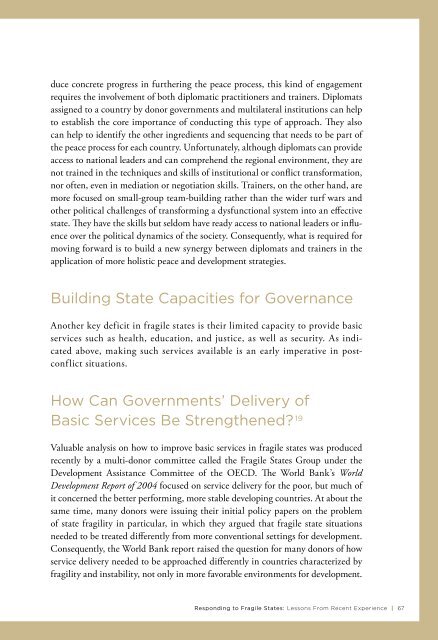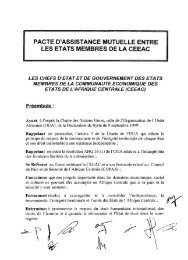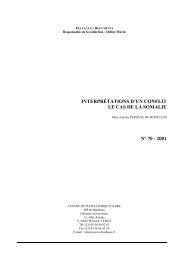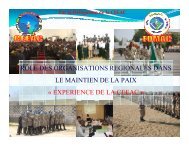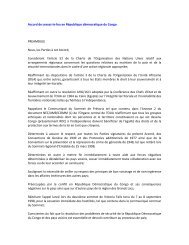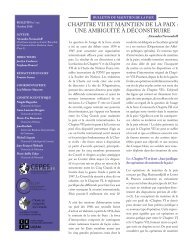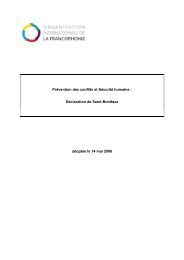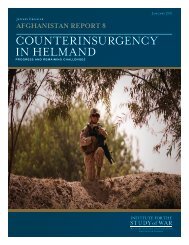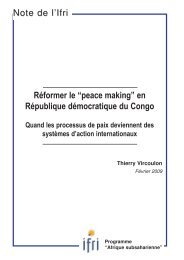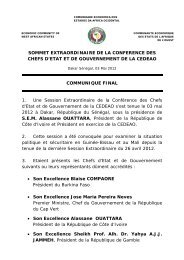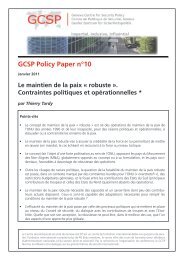engaging fragile states - Woodrow Wilson International Center for ...
engaging fragile states - Woodrow Wilson International Center for ...
engaging fragile states - Woodrow Wilson International Center for ...
You also want an ePaper? Increase the reach of your titles
YUMPU automatically turns print PDFs into web optimized ePapers that Google loves.
duce concrete progress in furthering the peace process, this kind of engagement<br />
requires the involvement of both diplomatic practitioners and trainers. Diplomats<br />
assigned to a country by donor governments and multilateral institutions can help<br />
to establish the core importance of conducting this type of approach. They also<br />
can help to identify the other ingredients and sequencing that needs to be part of<br />
the peace process <strong>for</strong> each country. Un<strong>for</strong>tunately, although diplomats can provide<br />
access to national leaders and can comprehend the regional environment, they are<br />
not trained in the techniques and skills of institutional or conflict trans<strong>for</strong>mation,<br />
nor often, even in mediation or negotiation skills. Trainers, on the other hand, are<br />
more focused on small-group team-building rather than the wider turf wars and<br />
other political challenges of trans<strong>for</strong>ming a dysfunctional system into an effective<br />
state. They have the skills but seldom have ready access to national leaders or influence<br />
over the political dynamics of the society. Consequently, what is required <strong>for</strong><br />
moving <strong>for</strong>ward is to build a new synergy between diplomats and trainers in the<br />
application of more holistic peace and development strategies.<br />
Building State Capacities <strong>for</strong> Governance<br />
Another key deficit in <strong>fragile</strong> <strong>states</strong> is their limited capacity to provide basic<br />
services such as health, education, and justice, as well as security. As indicated<br />
above, making such services available is an early imperative in postconflict<br />
situations.<br />
How Can Governments’ Delivery of<br />
Basic Services Be Strengthened? 19<br />
Valuable analysis on how to improve basic services in <strong>fragile</strong> <strong>states</strong> was produced<br />
recently by a multi-donor committee called the Fragile States Group under the<br />
Development Assistance Committee of the OECD. The World Bank’s World<br />
Development Report of 2004 focused on service delivery <strong>for</strong> the poor, but much of<br />
it concerned the better per<strong>for</strong>ming, more stable developing countries. At about the<br />
same time, many donors were issuing their initial policy papers on the problem<br />
of state fragility in particular, in which they argued that <strong>fragile</strong> state situations<br />
needed to be treated differently from more conventional settings <strong>for</strong> development.<br />
Consequently, the World Bank report raised the question <strong>for</strong> many donors of how<br />
service delivery needed to be approached differently in countries characterized by<br />
fragility and instability, not only in more favorable environments <strong>for</strong> development.<br />
Responding to Fragile States: Lessons From Recent Experience | 67


